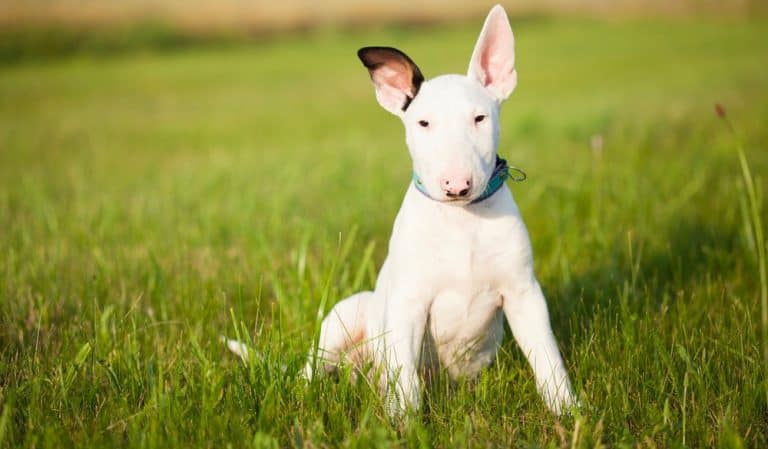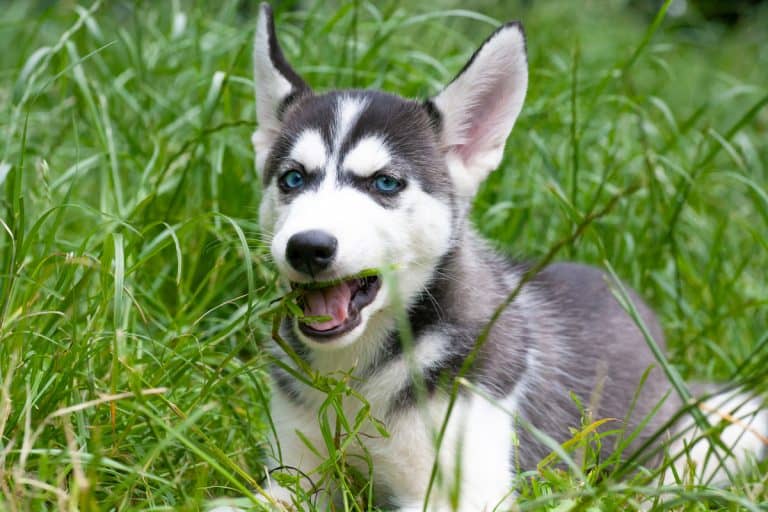Samoyed Weight Chart – Size & Growth Chart
If you have just bought a Samoyed puppy, you are probably doing a lot of research to know more about them.
The first thing to understand is the Samoyed weight chart as it will help you monitor your puppy’s weight.
On average, the weight of an adult male Samoyed is between 45 and 65 pounds, while their female counterparts weigh between 35 and 50 pounds.
This article will give you information on what to expect throughout the stages of a Samoyed’s growth, the health conditions that affect them as a breed, and many more.
When Is A Samoyed Fully Grown?
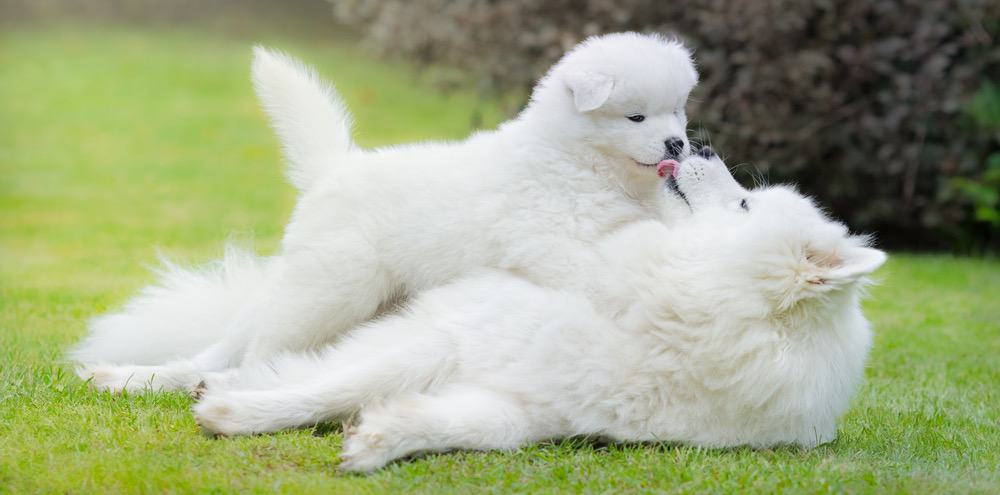
Being a large breed, Samoyeds take a longer time to reach their adult weight and height. The growth of your Samoyed can be affected by certain factors like genetics, health, diet, and physical activity.
As a Samoyed owner, expect your puppy to reach their adult size when they are between the ages of 9 and 18 months.
They become mentally mature between the ages of two and three years, so expect to have a large puppy in your house for a while.
Samoyed can reach their adult height but still put on more muscle to fill out their body frame.
Samoyed Weight Chart
Knowing your Samoyed’s weight at all stages of their life will ensure that their growth is healthy and normal.
Monitoring your puppy’s weight using a Samoyed growth chart will alert you to any early signs of health conditions that may affect your puppy. Catching these signs will enable you to administer treatments that can save your puppy’s life.
At the age of 3 months, your male Samoyed should weigh between 17.5 and 25 pounds.
They should weigh around 32 and 46 pounds at the age of 6 months and weigh about 42 and 63 pounds at the age of 1 year.
On the other hand, a female Samoyed should weigh between 14 and 17 pounds at 3 months. They should weigh between 26 and 32 pounds at the age of 6 months, and at the age of 1 year, they should weigh around 34 and 42 pounds.
Samoyed Puppy Weight Chart
| Age | Female Weight | Male Weight |
|---|---|---|
| 3 Months | 14 - 18 lbs | 16 - 25 lbs |
| 4 Months | 19 - 24 lbs | 23 - 33 lbs |
| 5 Months | 23 - 29 lbs | 28 - 41 lbs |
| 6 months | 26 - 33 lbs | 32 - 47 lbs |
| 7 months | 29 - 36 lbs | 36 - 52 lbs |
| 8 months | 31 - 38 lbs | 38 - 56 lbs |
| 9 months | 32 - 40 lbs | 40 - 59 lbs |
| 10 months | 33 - 41 lbs | 41 - 61 lbs |
| 11 months | 34 - 42 lbs | 42 - 63 lbs |
| 12 months | 34.5 - 43 lbs | 43 - 64 lbs |
| 13 months | 35 - 43.5 lbs | 43.5 - 65 lbs |
| 14 months | 35 - 44 lbs | 44 - 65.5 lbs |
| 15 months | 35 - 44.5 lbs | 44 - 66 lbs |
| 16 months | 35.5 - 45 lbs | 45 - 66.5 lbs |
Samoyed Growth Chart – What to Expect

Birth – 2 Weeks
During this stage, the puppy is spending most of their time sleeping and the rest of the time eating.
The puppy is born deaf, blind and do not have any tooth. The eyes and the ears of your puppy begin to open during the second week.
At this stage, the puppy is reliant on their mother for warmth, comfort, and food.
3 Weeks – 12 Weeks
During this stage, the milk teeth start appearing and weaning can start between the third and seventh week.
The puppy learns how to socialize with littermates, other dogs, and human beings. They start walking and learn basic discipline from their mother.
Rapid growth and development happen during this stage and the puppy becomes more active. During week 8, the puppy can be relocated to their new home. This is the right time to vaccinate and deworm your puppy.
4 Months – 9 Months
During this period, the permanent teeth begin to grow. Your puppy needs toys and more attention making it the right time to start training them. This is the stage where your puppy starts showing dominance and leadership traits.
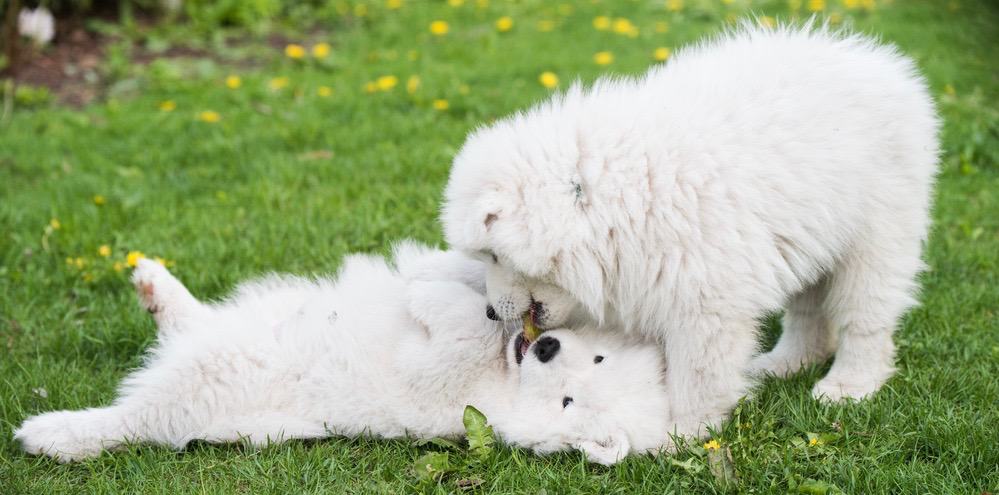
As your puppy grows in their physical size, their confidence grows as well. They also become more independent and start playing with other puppies.
10 Months – 18 Months
During this stage, your Samoyed puppy reaches their adult weight and height.
They now need less food than they needed as puppies to maintain a healthy weight. At this stage, your Samoyed is old enough for a professional training program or obedience classes.
Adult
As an adult, a Samoyed has fully grown physically and any changes in their weight should be monitored to ensure that they are not overweight. They will reach their mental maturity at about the age of 2 to 3 years.
During adulthood, ensure that you are providing your Samoyed enough exercise to keep them active and a well-balanced diet for their health.
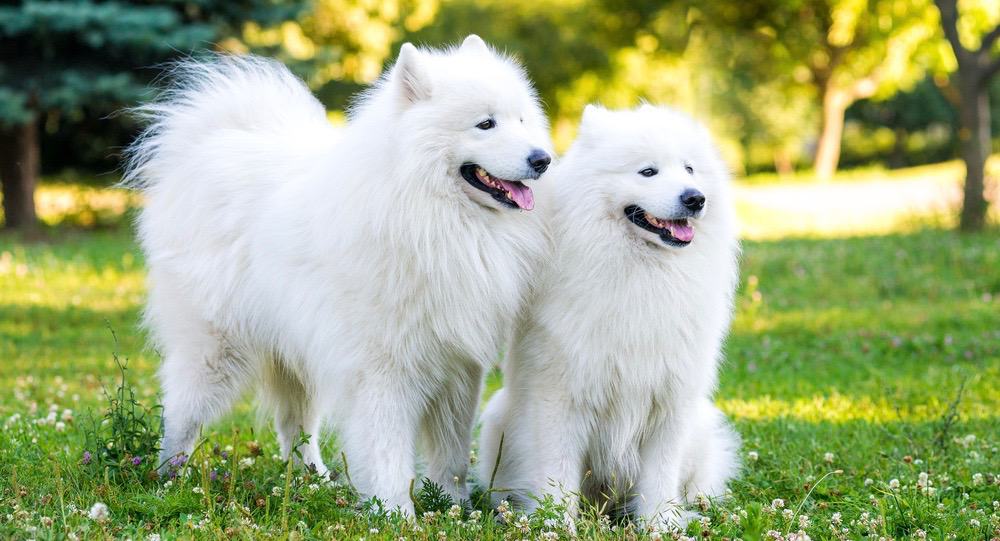
How Big Do Samoyeds Get?
To know how big your Samoyed will get when they are adults, look at their parents and paws. The size of the parents is an obvious indicator of the size of your Samoyed as an adult.
Ask your breeder about the weight and height of your puppy’s parents to estimate the adult size of your puppy.
The paws are another indicator of the adult size of your puppy. Unusually large paws mean that your puppy will fill out the other parts of their body to match their paws, making them a larger dog.
As adults, a female Samoyed weighs between 35 and 50 pounds while a male Samoyed is between 45 and 65 pounds.
The height of an adult female Samoyed is between 19 to 21 inches and the male Samoyed stands at a height of between 21 and 24 inches.
Will Neutering/Spaying My Samoyed Affect His Growth?
Most vets recommend that you spay or neuter your puppy when they are older and mature. This is between the ages of 6 and 9 months.
Spaying or neutering your Samoyed puppy does not affect their growth and development. However, if these procedures are done too early, it may increase the risk of elbow and hip dysplasia.
Neutering and spaying have several benefits such as reducing sexual urges and aggressiveness, lowering the risk of certain cancers, and increasing your puppy’s longevity.
Samoyed Size Chart
You can measure the height of your Samoyed puppy at home using a measuring tape. Ensure that your puppy is calm, relaxed, and not shrinking or bending sideways to get an accurate measure of their height.
Let your puppy stand straight against a wall. Find their withers which are located between the shoulder blades below the neck.
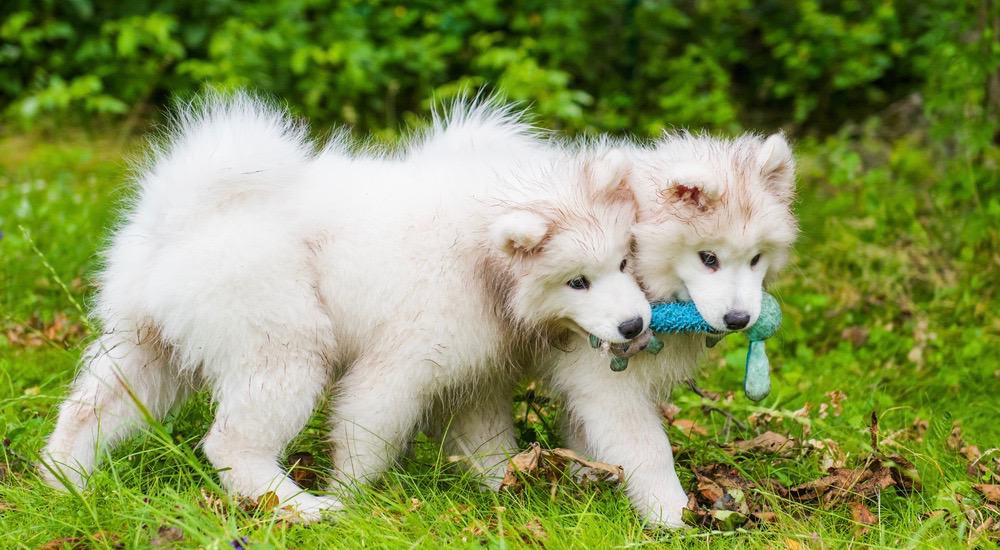
Mark a thin line on the wall to match the level of the withers. Then, measure from the ground to the mark, and that is your puppy’s height.
The height of a female Samoyed is around 19 to 21 inches while that of a male Samoyed is about 21 to 24 inches.
American Eskimo vs Samoyed Size
To the untrained eye, the Samoyed and the American Eskimo can look similar. However, there is a difference in their size.
The weight of a female American Eskimo is between 6 to 27 pounds and has a height of between 9 to 16 inches.
The weight of a male American Eskimo is around 8 to 36 pounds and has a height of between 9 to 19 inches. The sizes depend on whether they are toy, miniature, or standard, but will not exceed these ranges.
These American Eskimo weight and height ranges are well below the ranges for Samoyeds with a female Samoyed’s minimum weight of 35 pounds and minimum height 19 inches.
While the male Samoyed minimum weight is around 45 pounds and stands at a minimum height of 21 inches.
Factors That Affect Samoyed Growth
Genetics & Gender
Genetics is a common factor that affects the growth rate of puppies. This is because genetics is passed down from one generation to the next.
The size of your puppy’s parents is correlated to the size of your puppy. If the parents of your puppy are larger, chances are your puppy will be big as an adult.
Gender is another thing to consider when assessing the growth of your puppy. Generally, a female Samoyed is lighter and smaller than a male Samoyed.
Nutrition
Balanced and complete nutrition is necessary for your Samoyed puppy to achieve optimal growth. Your puppy’s food should include lean protein, good quality fats, complex carbohydrates, vitamins, minerals, and antioxidants.
When buying food for your puppy, ensure that they are from a reputable brand, high in quality, and contain all the necessary nutrients to help your puppy grow healthy and strong.
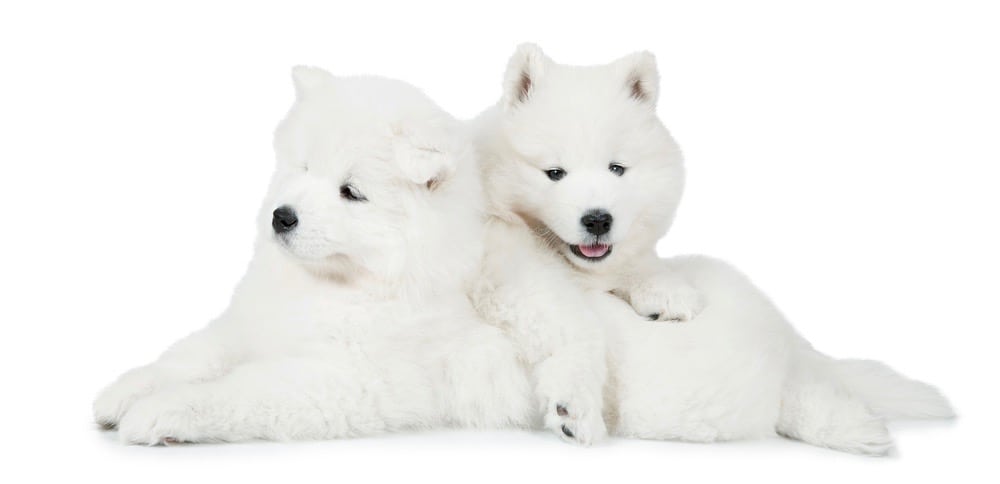
When feeding your puppy, consider their activity level to determine the number of calories they need to ensure that they are maintaining a healthy weight.
Physical Activity & Health
Since Samoyed puppies are intelligent and have high energy levels, they need daily mental stimulation and physical exercise.
Samoyed puppies require at least 2 hours of exercise every day. Short walks in the morning and long walks in the afternoon will keep your puppy active and healthy.
Certain health issues affect Samoyed as a breed, therefore, regular visits to the vet will ensure that any illness is diagnosed and treated at an early stage.
What If My Samoyed Is Not the Right Weight?
Is your Samoyed puppy overweight or underweight? The first thing to do is to take them to the vet for medical examination to rule out any health issues that may be causing the change in their weight.
Your vet will then advise you on how you can help your puppy gain or lose weight.
This is how you can help your puppy lose weight:
- Feed them low-fat meats such as lean meat or tuna fish.
- Feed them treats that are low in calories such as green beans, baby carrots, or apples.
- Walk your puppy or play with them.
- Feed them wet food instead of kibble.
- This is how you can help your puppy gain weight:
- Add more healthy calories to their diet.
- Spread mealtimes throughout the day.
- Add snacks and supplemental meals aside from the normal meals.
How Much Does It Cost to Own a Samoyed?
Before deciding to own a Samoyed, you need to know the costs involved. On average, the cost of buying a Samoyed puppy range between $750 and $2500 depending on factors such as location, bloodline, and breeder’s reputation.
Other costs involved are:
- Shipping and transport – if you are getting your Samoyed puppy from another location, you may incur an extra $100.
- Registration – registering your puppy with the American Kennel Club is about $35.
- Shelter – dog kennels or crates cost around $19 to $322 depending on quality, size, and brand.
- Training – basic group training costs between $150 to $295 while private training can cost around $1200.
- Food – high-grade foods costs between $36 to $71 while the common variety cost about $2 to $18.
- Grooming – for every few weeks, your puppy needs grooming and can cost you around $100.
- Accessories – these include collars, toys, and leashes, which cost around $65.
- Medical care – regular medical check-ups can cost between $54 to $63.
- Insurance – this is an optional expense that costs between $25 to $72.
Samoyed Genetics and Common Health Problems
The following are the health problems to watch out for if you own a Samoyed:
Cardiac problems – the Samoyed is at risk of various heart problems such as aortic stenosis/sub-aortic stenosis, atrial septal defect, and pulmonic stenosis.
To ensure that your Samoyed puppy has a lower risk of getting these heart issues, ask your breeder if your puppy’s parents have had a cardiac exam.
Alopecia X – this is the most common reason for hair loss in Samoyed. This occurs when the adrenalin glands produce excess sex hormones.
Early diagnosis is necessary, and treatment can be administered in form of drugs.
Diabetes Mellitus – this condition causes a sudden spike in glucose levels in the blood due to low insulin levels. Regular insulin injections and diet management are the treatments for this condition.
Eye problems – Samoyed can be affected by conditions such as distichiasis, cataracts, progressive retinal atrophy, and glaucoma.
Hip dysplasia – this is a common condition affecting Samoyed puppies and can be caused by nutrition, genetics, and environment.
To reduce the chance of your Samoyed getting this disease, ensure that they have a well-balanced diet and do not exercise excessively.
Hypothyroidism – this happens when the thyroid hormone is inadequate. It leads to weight gain, lethargy, and weight loss in your puppy.
Final Words
Paying attention to your puppy’s diet, mental, and physical well-being will enable you to keep track of their growth curve and maintain an ideal weight throughout their stages of life.
This means that you must invest money, time, and effort to ensure that your puppy is healthy and happy.
Hopefully, this article has given you the information you need to know about your Samoyed puppy to provide them with the best life they need and deserve.

